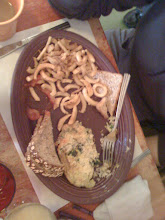Wikipedia, the online encyclopedia for the masses, by the masses is increasing its editorial oversight. According to CNN, the web has "erupted in debate" over this news. So I guess this is my contribution to... the lava. As I was telling KM over brunch this morning, I think this is a move indicative of more editorial oversight for The Net in general. I don't want to be reading an entry on some little-known historical event only to see that someone's edited its last paragraph to include the sentence "Billy Fisher likes tits" or, even worse, to see that every other sentence in the entry is "questionable" or needs further proof to be considered legit. I like knowing the information I'm getting is written by experts. Call me crazy. So I guess my lava in this case is taking the form of polite applause for Wikipedia.
It seems like what we've done in the past 10 years or so as a society is to throw anything and everything up online. And it is awesome, in the true sense of the word. That it is such a large and vast ever-moving wave of information that it inspires awe and fear and joy all at once when trying to wrap your mind around its power. And now, I want at least part of it to be reliable. As Wikipedia responds to user complaints of inauthenticity and false information, I hope that online news sources will be held to similar standards. That's not to say that people still shouldn't be able to throw whatever completely random crap they want up on the Internet, but just that there will be a certain "tier" of information sites that are 'vetted in some way.
I'll wrap up my whiny little essay with a link to a NY Times article on a new documentary about a now-batshit insane Internet pioneer who seems to think we will all be living in a virtual world in 20 years. Here's the trailer:
And one for old times' sake:
-KE


